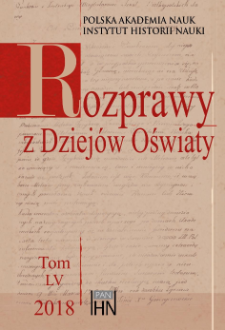- Search in all Repository
- Literature and maps
- Archeology
- Mills database
- Natural sciences
Advanced search
Advanced search
Advanced search
Advanced search
Advanced search

Object
Title: The Piarists and the Commission of National Education’s Piarist Department : Origins, contexts, interpretations
Subtitle:
Pijarzy i Wydział Pijarski Komisji Edukacji Narodowej : Korzenie, konteksty, interpretacje
Publisher:
Instytut Historii Nauki im. Ludwika i Aleksandra Birkenmajerów Polskiej Akademii Nauk
Place of publishing:
Date on-line publ.:
Type of object:
Abstract:
In the article, the usual emphasis on innovative elements in the description of the characteristics of Stanisław Konarski’s education reform has been contrasted with opinions pointing to the compromise, halfway and eclectic character of the undertaken measures. In fact, it was not until the Piarist schools were subjugated to the Commission of National Education that their status, objectives and programmes were changed. It has to be borne in mind that until the times of the Commission, any changes in regard to education the Piarists had proposed had to be approved by the Order’s supervisors and could not expose the Order to conflict with the Church authorities. On their part, the orders saw education only in relation to the piety that they lived by and desired to instil in others. It impeded the development of science and the distinguished scholars of particular orders for a long time could not bring themselves to accept science’s autonomy from faith. The Commission of National Education removed those barriers to a great extent, continually emphasising the necessity to modernise the programme of education and carefully supervising that process in the schools run by the Piarist Order. What was notable was that by the Commission’s recommendations, Piarist colleges began, more distinctly than ever, radiating the Enlightenment ideas. The greater stress on the teaching of mathematical and natural sciences and the promotion of experiments in pure science were reflective of that transformation.
Relation:
Volume:
Start page:
End page:
Detailed Resource Type:
Format:
Resource Identifier:
0080-4754 ; oai:rcin.org.pl:243348
Language:
Rights:
Creative Commons Attribution BY-NC-ND 4.0 license
Terms of use:
Copyright holder:
Instytut Historii Nauki im. Ludwika i Aleksandra Birkenmajerów PAN
Original in:
Library of the Institute for the History of Science PAS
Access:
Object collections:
- Digital Repository of Scientific Institutes > Literature > Journals/Articles
- Digital Repository of Scientific Institutes > Partners' collections > L.&A. Birkenmajer Institute for the History of Science PAS > Biblioteka IHN PAN > Magazines
Last modified:
Jan 10, 2025
In our library since:
Dec 31, 2024
Number of object content downloads / hits:
6
All available object's versions:
https://rcin.org.pl./publication/280390
Show description in RDF format:
Show description in RDFa format:
Show description in OAI-PMH format:
Objects Similar
Baccigalupi, Stefan ( –1801)
Popławski, Antoni (1739–1799)
Popławski, Antoni (1739–1799)
Popławski, Antoni (1739–1799)
Polska. Komisja Edukacji Narodowej.

 INSTYTUT ARCHEOLOGII I ETNOLOGII POLSKIEJ AKADEMII NAUK
INSTYTUT ARCHEOLOGII I ETNOLOGII POLSKIEJ AKADEMII NAUK
 INSTYTUT BADAŃ LITERACKICH POLSKIEJ AKADEMII NAUK
INSTYTUT BADAŃ LITERACKICH POLSKIEJ AKADEMII NAUK
 INSTYTUT BADAWCZY LEŚNICTWA
INSTYTUT BADAWCZY LEŚNICTWA
 INSTYTUT BIOLOGII DOŚWIADCZALNEJ IM. MARCELEGO NENCKIEGO POLSKIEJ AKADEMII NAUK
INSTYTUT BIOLOGII DOŚWIADCZALNEJ IM. MARCELEGO NENCKIEGO POLSKIEJ AKADEMII NAUK
 INSTYTUT BIOLOGII SSAKÓW POLSKIEJ AKADEMII NAUK
INSTYTUT BIOLOGII SSAKÓW POLSKIEJ AKADEMII NAUK
 INSTYTUT CHEMII FIZYCZNEJ PAN
INSTYTUT CHEMII FIZYCZNEJ PAN
 INSTYTUT CHEMII ORGANICZNEJ PAN
INSTYTUT CHEMII ORGANICZNEJ PAN
 INSTYTUT FILOZOFII I SOCJOLOGII PAN
INSTYTUT FILOZOFII I SOCJOLOGII PAN
 INSTYTUT GEOGRAFII I PRZESTRZENNEGO ZAGOSPODAROWANIA PAN
INSTYTUT GEOGRAFII I PRZESTRZENNEGO ZAGOSPODAROWANIA PAN
 INSTYTUT HISTORII im. TADEUSZA MANTEUFFLA POLSKIEJ AKADEMII NAUK
INSTYTUT HISTORII im. TADEUSZA MANTEUFFLA POLSKIEJ AKADEMII NAUK
 INSTYTUT JĘZYKA POLSKIEGO POLSKIEJ AKADEMII NAUK
INSTYTUT JĘZYKA POLSKIEGO POLSKIEJ AKADEMII NAUK
 INSTYTUT MATEMATYCZNY PAN
INSTYTUT MATEMATYCZNY PAN
 INSTYTUT MEDYCYNY DOŚWIADCZALNEJ I KLINICZNEJ IM.MIROSŁAWA MOSSAKOWSKIEGO POLSKIEJ AKADEMII NAUK
INSTYTUT MEDYCYNY DOŚWIADCZALNEJ I KLINICZNEJ IM.MIROSŁAWA MOSSAKOWSKIEGO POLSKIEJ AKADEMII NAUK
 INSTYTUT PODSTAWOWYCH PROBLEMÓW TECHNIKI PAN
INSTYTUT PODSTAWOWYCH PROBLEMÓW TECHNIKI PAN
 INSTYTUT SLAWISTYKI PAN
INSTYTUT SLAWISTYKI PAN
 SIEĆ BADAWCZA ŁUKASIEWICZ - INSTYTUT TECHNOLOGII MATERIAŁÓW ELEKTRONICZNYCH
SIEĆ BADAWCZA ŁUKASIEWICZ - INSTYTUT TECHNOLOGII MATERIAŁÓW ELEKTRONICZNYCH
 MUZEUM I INSTYTUT ZOOLOGII POLSKIEJ AKADEMII NAUK
MUZEUM I INSTYTUT ZOOLOGII POLSKIEJ AKADEMII NAUK
 INSTYTUT BADAŃ SYSTEMOWYCH PAN
INSTYTUT BADAŃ SYSTEMOWYCH PAN
 INSTYTUT BOTANIKI IM. WŁADYSŁAWA SZAFERA POLSKIEJ AKADEMII NAUK
INSTYTUT BOTANIKI IM. WŁADYSŁAWA SZAFERA POLSKIEJ AKADEMII NAUK




































